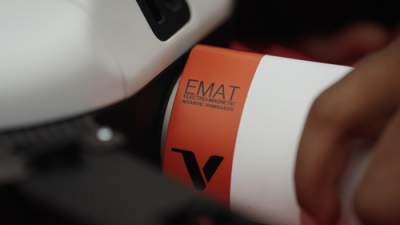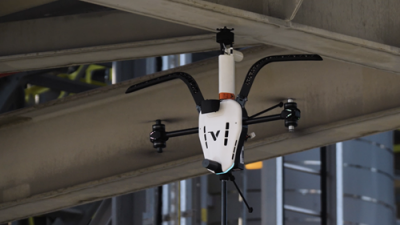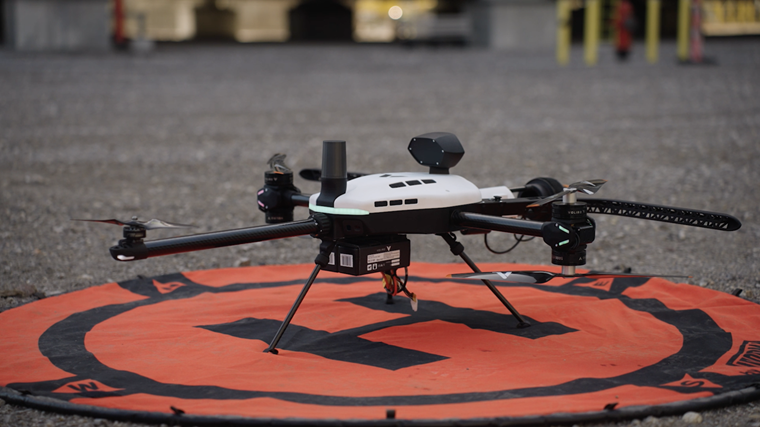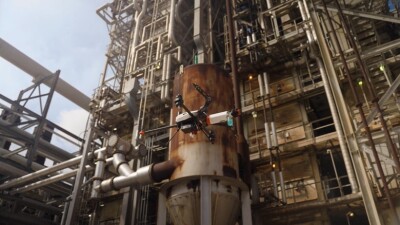The Swiss-based robotics engineering company Voliro recently announced the release of the Voliro T Version 5, a new version of the company’s first-generation aerial robotic platform for performing contact-based inspections and maintenance tasks at height.
 The Voliro T is a non-destructive testing (NDT) drone with omnidirectional flight capabilities and tiltable rotors. It enables precise and stable inspections in complex industrial environments. The latest version incorporates many learnings from the field, gained during a two-year general availability period when companies used the drone for commercial operations.
The Voliro T is a non-destructive testing (NDT) drone with omnidirectional flight capabilities and tiltable rotors. It enables precise and stable inspections in complex industrial environments. The latest version incorporates many learnings from the field, gained during a two-year general availability period when companies used the drone for commercial operations.
Offering better stability, reliability, and ease of use
“Using the system regularly in different conditions and regions of the world resulted in a completely different perspective as opposed to testing environments in the early adoption period prior to launching the product” explains Laurent Zimmerli from Voliro. The company focused on topics related to daily operations, making it a more valuable tool in the operational environment, such as better stability, reliability, and ease of use.
The Voliro T Version 5 is used in wind farms, oil refineries, and remote industrial facilities to perform aerial inspections. The drone is used to measure the thickness of different materials to see if a difference could indicate corrosion. These measurements are contact-based, as the drone can push against a surface and apply force. For reliable measurements, stable force is required.
More stability means reliable behavior of the drone, which results in higher customer confidence when deploying the system. More stability is offered by using a new tail motor and propellor for the drone, for more precise measurements in windy conditions or gusts, which occur often when flying close to structures.
Higher-quality materials have been selected to improve durability and steadiness, for example withstanding harsh conditions including high temperatures or strong winds. “Replacing system components with better materials makes a huge difference in operational environments, and easier to assemble without any additional tools,” adds Zimmerli.
5G module
On the software side of things, there’s a new built-in 5G module which means the drone is online while in the air. This enables real-time data transfer to and from the Voliro Cloud for health monitoring, proactive maintenance, and software upgrades. “Being online while flying will make the life of a drone operator easier, as they won’t need to upload the data in the office anymore in the future. Instead, someone in the office can look at the inspection and results even while the drone is in the air. It also means that software updates and mission-critical adjustments can be made from anywhere,” explains Zimmerli.
Ultrasound Testing (UT) and Dry Film Thickness (DFT) measurements
Customers adopting the system today immediately see new applications they’d like to use it for in the future but aren’t supported yet. Currently, the company offers payloads for measuring material thickness and coating thickness.  The first applies to ultrasound testing (UT), which uses high-frequency sound waves to examine objects’ material characteristics and take dimensional measurements. UT requires a clean surface to get reliable results.
The first applies to ultrasound testing (UT), which uses high-frequency sound waves to examine objects’ material characteristics and take dimensional measurements. UT requires a clean surface to get reliable results.
For reliable material thickness measurements on dirty surfaces, Voliro offers an electromagnetic acoustic transducer (EMAT). Finally, the company uses Dry Film Thickness (DFT) measurements for coating thickness measurements. A DFT measurement is the go-to measure for verifying the correct application of protective coatings and finishes after it has dried on a cured surface, which helps asset owners prevent premature coating failures and stay compliant with regulations.
Detecting corrosion through insulation
The company received a lot of questions for a payload that performs measurements to detect corrosion through a certain amount of insulation. A new payload is currently being developed that can perform such measurements. The company also introduced a new probe that also uses UT and resists temperatures up to 260 degrees Celsius. This enables the system to perform measurements on hot surfaces such as chimneys and smokestacks without closing down the facility.
Voliro originated from a research project to develop a drone capable of applying force against an object, as a conventional drone would become unstable the moment it needed to tilt to apply force. Today, Voliro offers both a drone capable of pushing against surfaces, applying force, and the payload to take reliable thickness measurements.
The platform now measures material thickness, paint thickness, and corrosion under insulation. “It offers our industrial inspection customers everything they need to know for taking the next step, which would be a repair or maintenance work. By supporting more applications with a single platform, our customers become more productive. This will definately accelerate market adoption.”















Comments